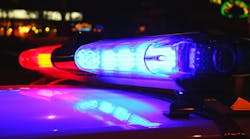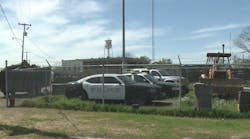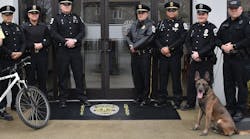When an incident like the recent Virginia Tech shooting spree occurs, it is difficult not to comment. There are always lessons to be learned. With the permission of "His Editor-ship," I would like to at least touch on a few of the thoughts that came to my mind, as both the crime and the coverage unfolded. The fact that the blame for this horrendous incident lies squarely on the shoulders of the shooter, Seung-Hui Cho, seems to have escaped many. Like any such incident, there were points in time that intervention by others could have changed the outcome, but the killing and wounding of innocent people at Virginia Tech was the responsibility of just one person. But, we are in the business of dealing with such people, so we get the misdirected anger. I was still appalled, however, by both the questions (accusations, actually, put in the form of questions) and the "expert" analysis by many of the media representatives. They were desperately trying to find fault, fix blame and sensationalize this incident, well before the facts were even known. Herewith are a few paraphrased questions and my responses.
Why didn't the police/university advise the students sooner after the first shootings?
The media loved this one. After all, they're in the business of informing people about important events. One little problem though: what do you tell people and what do they do after you've informed them? Suppose the university put out immediate information that the first shooting had occurred. At that point, it was just "news." There was no indication that there would be any other danger, nor was there any idea that Cho was the guy they were looking for. So what did they expect the students to do? And, if the information was meant as a warning, again I ask: what were the students expected to do? If the students have been effectively trained in how to respond when they are advised that a potential threat exists, all is well. If not, then the message would have to contain detailed instructions. Stay home? Go back home? What if "home" is on the campus? Continue to your next classroom location? Gather at certain locations? Avoid certain areas/buildings? What about people that don't get the warnings? We see this all the time in other types of emergencies. Warnings are effective only if those being warned know what to do once they've received the warnings. Otherwise, chaos usually ensues, along with the inevitable fault finding and finger pointing. Have the students at VT been given such training? As far as the media is concerned, informing people seems to be the be-all and end-all. They exist for "informing." Anyone who actually has to cope with emergencies, however, understands that informing is only one part of a very complex problem.
How should the warnings be given?
Cell phones? I wonder what the capacity of the cell phone systems in the area of VT might be? Most of the places I've been, the cell phone systems get overwhelmed soon after a major incident, simply because people won't stay off of them with their non-emergency calls. E-mails?
A number of the students interviewed said that they didn't check their e-mails that morning. They were in a hurry to get to class. A campus-wide PA system? Possible, but I don't think anyone could have sold that to the University's budget committee. At least, not prior to April 16th. Perhaps the old "Town Crier" system? Can you just imagine the campus grapevine getting hold of something like this?
Why wasn't the campus locked down immediately?
Ok, how quickly is immediately? How long would it take to secure over 100 separate buildings on a 2,600 acre campus? That's the equivalent of a good sized town. And, of course, what about the students who were still arriving for classes? This wasn't a K-12 sort of campus, where everyone starts at the same time and leaves at the same time. The logistics of such an undertaking are mind boggling. Locking down the campus would take a lot of time and a lot of manpower. Not that I'm saying it shouldn't be done, but let's be realistic about what it takes to accomplish that formidable of a task. Then there's the small matter that the gunman (who was still unidentified at the time) was one of the very students they were expected to protect. Cho would have received the same warnings as everyone else and could have planned his next actions based on the campus response. I can just see Cho knocking on the door of Norris Hall, pretending to be frightened and seeking safe refuge. There would have been no reason to deny him entry. After all, he was just another student.
What about the campus being a "gun free" zone?
Well, Cho must have had a pretty good idea that he would be the only armed person in either of the buildings. Bad guys don't follow the rules. If killing other human beings for malevolent reasons is acceptable to you, then violating a gun law or two is hardly likely to bother your conscience, particularly if you are willing to die in the process. Rather than being safer, the law abiding folks are probably at greater risk, as the "safe predator" zone is clearly defined by law or by the posting of private property. What gun free zones really mean for the police is that the people who make the rule or the law expect you to be responsible for protecting the people in their zone. Is that a reasonable expectation? Effectively prohibiting guns, or any weapons for that matter, can only be accomplished with tight physical security measures, including metal detectors, x-ray machines and physical searches. Sometimes even that doesn't work. Can you imagine the resources required to provide airport-like security at just one college campus like Virginia Tech? Or are we now to build walls around areas the size of cities and man the drawbridges?
An even tougher question is: Would allowing lawfully armed students, faculty or anyone else on campus have made any difference? The answer is educated speculation, but as far as I'm concerned, absolutely "yes." Would the possibility that he would face armed resistance soon after starting his shooting spree have acted as a deterrent to Cho? We can't say for sure, but does history tell us that the killing of innocents in such cases stops when the shooter(s) are confronted by any armed resistance, be it police or armed citizens. It stopped Harris and Klebold at Columbine. It stopped Charles Whitman in the Texas Tower, it has stopped a number of others and it finally stopped Cho, when he realized that the police had arrived. We have a new paradigm for "active shooters" ever since Columbine. Engage and isolate. The maniacs that commit these despicable crimes against apparently helpless victims never have the stomach to face determined resistance that places them in danger. Much was made of the number of innocent people killed and wounded that day. Much was made of the carnage caused by one man with two guns. Not much mention is made of the fact that only one other gun, in the right hands, could have stopped the massacre even as it began. And to those who claim that more guns could have accidentally injured innocent bystanders, I ask this: 32 innocent people were slaughtered under the "no guns" rule. Do you really expect me to believe that it would have been worse?
There are other issues, but space doesn't allow more at this time. The police and the university did their best in a very difficult and unusual situation. Lessons will be learned. Things will change and we will be even better prepared. Painful and expensive decisions will have to be made about training, staffing, equipment, the failure of the firearms background checks to detect Cho's mental health record and even whether people have the right to effectively defend themselves. And, after all of that, down the road some other predator will find the soft spots in the society's armor and it will happen again. I'll bet that the ones who have learned the least from all of this will be the media.


